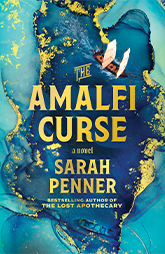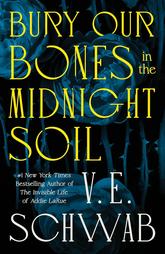
 |
NEW BOOK REVIEWS |
The Amalfi Curse |
Review: I really loved The Amalfi Curse. It had the perfect mix of mystery, history, and just the right touch of magic. The story follows Haven, a nautical archaeologist, who heads to the Amalfi Coast after her father's death, and what she uncovers is far more complicated than the treasure she was searching for. Ther's also a second storyline from the 1800s features Mari, a sea witch bound by a dark ... More |
Book Summary: Haven Ambrose, a trailblazing nautical archaeologist, has come to the sun-soaked village of Positano to investigate the mysterious shipwrecks along the Amalfi Coast. But Haven is hoping to find more than old artifacts beneath the azure waters; she is secretly on a quest to locate a trove of priceless gemstones ... More |
Bury Our Bones in the Midnight Soil |
Review: This book is generating a lot of buzz and has been on the bestseller list for several weeks, which piqued my interest. I was hesitant at first because it's a love story about vampires with a dark and gothic feel, which isn't usually my preferred genre. However, I loved the aurthor's previous book, The Invisible Life of Addie LaRue, and was excited to give this one a try.... More |
Book Summmary: The new genre-defying novel about immortality and hunger from V. E. Schwab, the #1 New York Times bestselling author of The Invisible Life of Addie LaRue.
This is a story about hunger. 1532. Santo Domingo de la Calzada. A young girl grows up wild and wily-her beauty is only outmatched by her dreams of escape. But Maria knows she can only ever be a prize, or a pawn, in the games played by men. When an alluring stranger offers an alternate path, Maria makes a desperate choice. She vows to have no regrets. ..... More |
PBR's Book Club Pick |
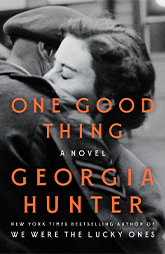 One Good Thing By Georgia Hunter Book Summary:
From the New York Times-bestselling author of We Were the Lucky Ones , an unforgettable story of hardship and hope, courage and resilience, that follows one young woman's journey through war-torn Italy. 1940, Emilia Romagna. Lili and Esti have been best friends since meeting at the University of Ferrara; when Esti's son Theo is born, they become as close as sisters. There is a war being fought .... More
|
Review: "This book was fantastic - emotionally gripping and well-researched, with complex, relatable characters and an incredible sense of time and place.
It's about two close friends, Lili and Esti, who are Jewish and living in Italy during WWII, and how they survived Mussolini's Racial Laws and Germany invading Italy by forging papers, joining illegal resistance groups, and relying on the kindness of strangers.... More |
Praise:
"A stunning story of survival." -People
"Epic, intimate, thrilling and beautiful. One Good Thing is a story of unbreakable friendship, of remarkable resilience, of how love and hope can shine through even the darkest, most unimaginable horrors. Stunning." -Chris Whitaker, New York Times bestselling author of All the Colors of the Dark "A stirring novel of bravery and sacrifice in WWII Italy. . . Fans of Hunter's previous book and the miniseries based on it will be pleased." -Publishers WeeklyMore Book Club Questions - One Good Thing by Georgia Hunter
| |
Spot Light Books |
YA Fantasy (ages 14-17) |
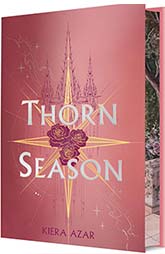 Thorn Season By Kiera Azar Book Summary:
Shadow and Bone meets The Selection in this first book in Kiera Azar's sharp, sexy, and twisty debut YA romantasy trilogy!
"Dark, sexy, and completely addictive, romantasy lovers will devour Azar's Thorn Season. With epic betrayals, shocking twists, and delicious tension, I couldn't turn the pages fast enough. An absolute thrill of a novel."-Rachel Griffin, New York Times bestselling author of The Nature of WitchesMore |
Memoir |
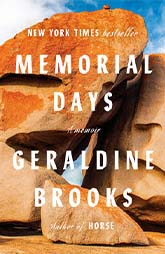 Memorial Days By Geraldine Brooks Book Summary:
A New York Times Bestseller. A heartrending and beautiful memoir of sudden loss and a journey towards peace, from the bestselling, Pulitzer Prize-winning author of Horse . Many cultural and religious traditions expect those who are grieving to step away from the world. In contemporary life, we are more often met with red tape and to-do lists. This is exactly what happened to Geraldine Brooks when her partner ...More
Priase:
A People Best Book of February 2025
"Brooks wield[s] precise and often beautiful language and, in the most graceful way possible, point[s] a way forward. A rich account of marriage and mourning ... Memorial Days contains much compassionate advice for those who have, or will, suffer the same ferocious blow." -The Washington Post "Brooks and her husband, Tony Horwitz, had been reporters in war zones, but nothing prepared her for his sudden death, at just 60, after three decades together. Four years later, she journeyed to a remote island near Tasmania "to do the unfinished work of grieving." This memoir is her report back, at once a spare accounting of tragic detail and an appreciation of the healing properties of solitude." -The New York Times Book Review ...More |
Backlist Book |
Backlist books are valuable because they help readers discover timeless classics and lesser-known gems. They provide insight into an author's earlier work, highlighting their growth and creativity. Plus, their established readership often indicates quality and lasting appeal. |
 Everything I Never Told You By Celeste Ng Book Summary:
Lydia is dead. But they don't know this yet . . .So begins the story of this exquisite debut novel, about a Chinese American family living in 1970s small-town Ohio. Lydia is the favorite child of Marilyn and James Lee; their middle daughter, a girl who inherited her mother's bright blue eyes and her father's jet-black hair. Her parents are determined that Lydia will fulfill the dreams they were unable to pursue-in Marilyn's case that ... More
Book Review:
As the story opens, Lydia, the middle and favorite child of James and Marilyn Lee is missing and in short order found dead in a nearby lake. This leads the reader to believe this is a puzzle mystery. How and why did this teenage girl die? But in reality the book is so much more. It's about the consequences of dysfunctional family dynamics and the heaviness that hovers over those with failed dreams ...More
|
Celebrity Book Club Picks |
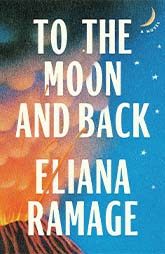 Reese Witherspoon's Book Club PickTo the Moon and Back By Eliana Ramage Book Summary:
One young woman's relentless quest to become the first Cherokee astronaut will irrevocably alter the fates of the people she loves most in this tour de force of a debut about ambition, belonging, and family. My mother took my sister and me, and she drove through the night to a place she felt a claim to, a place on earth she thought we might be safe. ...More
|
 Reese Witherspoon's Summer YA PickStuck Up And Stupid By Angourie Rice and Kate Rice Book Summary:
This sharp, hilarious, and heartfelt novel is giving major Austen vibes with a fresh twist - and we're obsessed."-Reese's Book Club (Reese's Book Club Summer '25 YA Pick). An ordinary girl. A Hollywood star. A love story that could change everything. Pride and Prejudice gets a modern twist in this summer romance from two debut authors who ....More
|
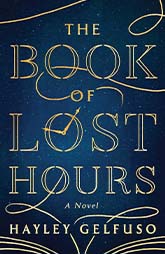 GMA's Book Club PickThe Book of Lost Hours By Hayley Gelfuso Book Summary:
For fans of The Ministry of Time and The Midnight Library, a sweeping, unforgettable novel following two remarkable women moving between postwar and Cold War-era America and the mysterious time space, a library filled with books containing the memories of those who ...More
|
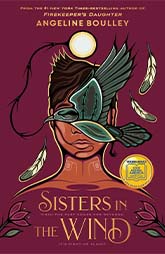 GMA's YA PickSisters in the Wind By Angeline Boulley Book Summary:
From the instant New York Times bestselling author of Firekeeper's Daughter and Warrior Girl Unearthed comes a daring new mystery about a foster teen claiming her heritage on her own terms. Ever since Lucy Smith's father died five years ago, "home" ...More
|
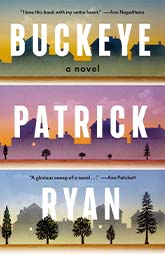 Read With Jenna Book Club PickBuckeye By Patrick Ryan Book Summary:
One town. Two families. A secret that changes everything. "A small-town novel of epic proportions" (Tom Perrotta), this captivating story weaves the intimate lives of two midwestern families across generations, from World War II to the late twentieth century. ...More
|
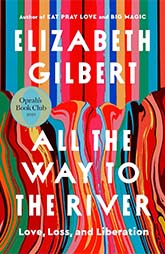 Oprah's Book Club Pick (#118)All The Way To The River By Elizabeth Gilbert Book Summary:
In 2000, Elizabeth Gilbert met Rayya. They became friends, then best friends, then inseparable. When tragedy entered their lives, the truth was finally laid bare: The two were in love. They were also a pair of addicts, on a collision course toward catastrophe ...More
|
More Reading Suggestions |
|
If you have a passion for reading and, like most, have no time to find the right book, browse Trending & Popular Books. They are all page-turners, and they all let you escape from reality. |
 The Storm We Made By Vanessa Chan
Book Summary: In this "espionage-laden family epic" (Vanity Fair), an ordinary housewife becomes an unlikely spy-and her dark secrets will test even the most unbreakable ties. Malaya, 1945. Cecily Alcantara's family ... More
|
 Beautiful Ugly by Alice Feeney
Book Summary: Author Grady Green is having the worst best day of his life. Grady calls his wife to share some exciting news as she is driving home. He hears Abby slam on the brakes, get out of the car, then nothing. When he eventually finds her....More
|
 Listen For The Lie by Amy Tintera
What if you thought you murdered your best friend? And if everyone else thought so too? And what if the truth doesn't matter? After Lucy is found wandering the streets, covered in her best friend Savvy's blood, everyone thinks...More
 Strange Sally Diamond by Liz Nugent
This "haunting and poignant tale, one that won't be easy to forget any time soon" (Mystery and Suspense Magazine), follows an enigmatic woman confronting her unknown past-from internationally bestselling author Liz Nugent.Reclusive Sally Diamond is thrust into the media spotlight....More
|
 Stolen Queen by Fiona Davis
From New York Times bestselling author Fiona Davis, an utterly addictive new novel that will transport you from New York City's most glamorous party to the labyrinth streets of Cairo and back. Egypt, 1936: When anthropology student Charlotte Cross is offered a coveted spot...More
|
 The Book Of Doors By Gareth Brown
A debut novel full of magic, adventure, and romance, The Book of Doors opens up a thrilling world of contemporary fantasy for readers of The Midnight Library, The Invisible Life of Addie Larue, The Night Circus, and any modern story ...More
|
Visit Our Blog |
You May Also Like |
 |
